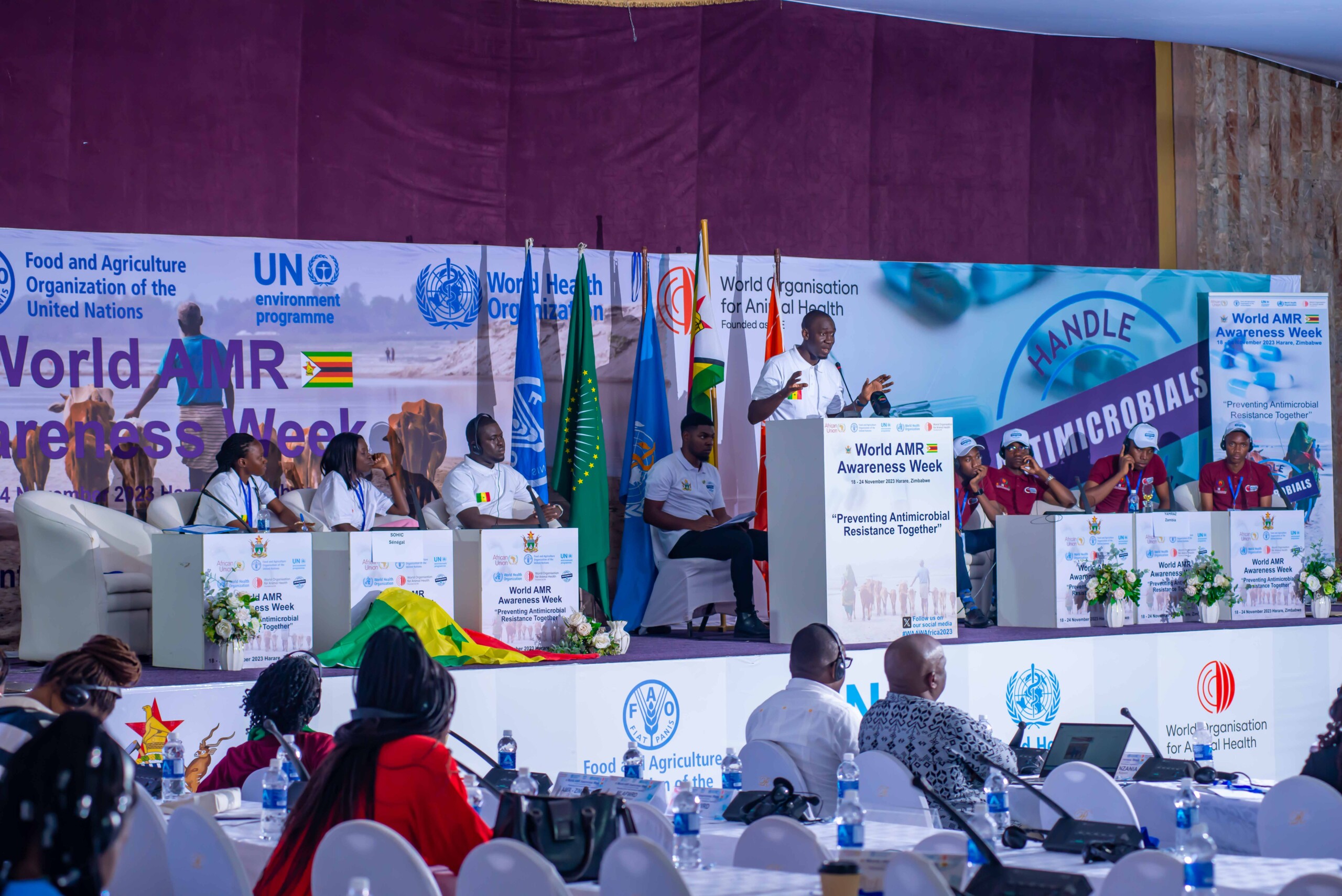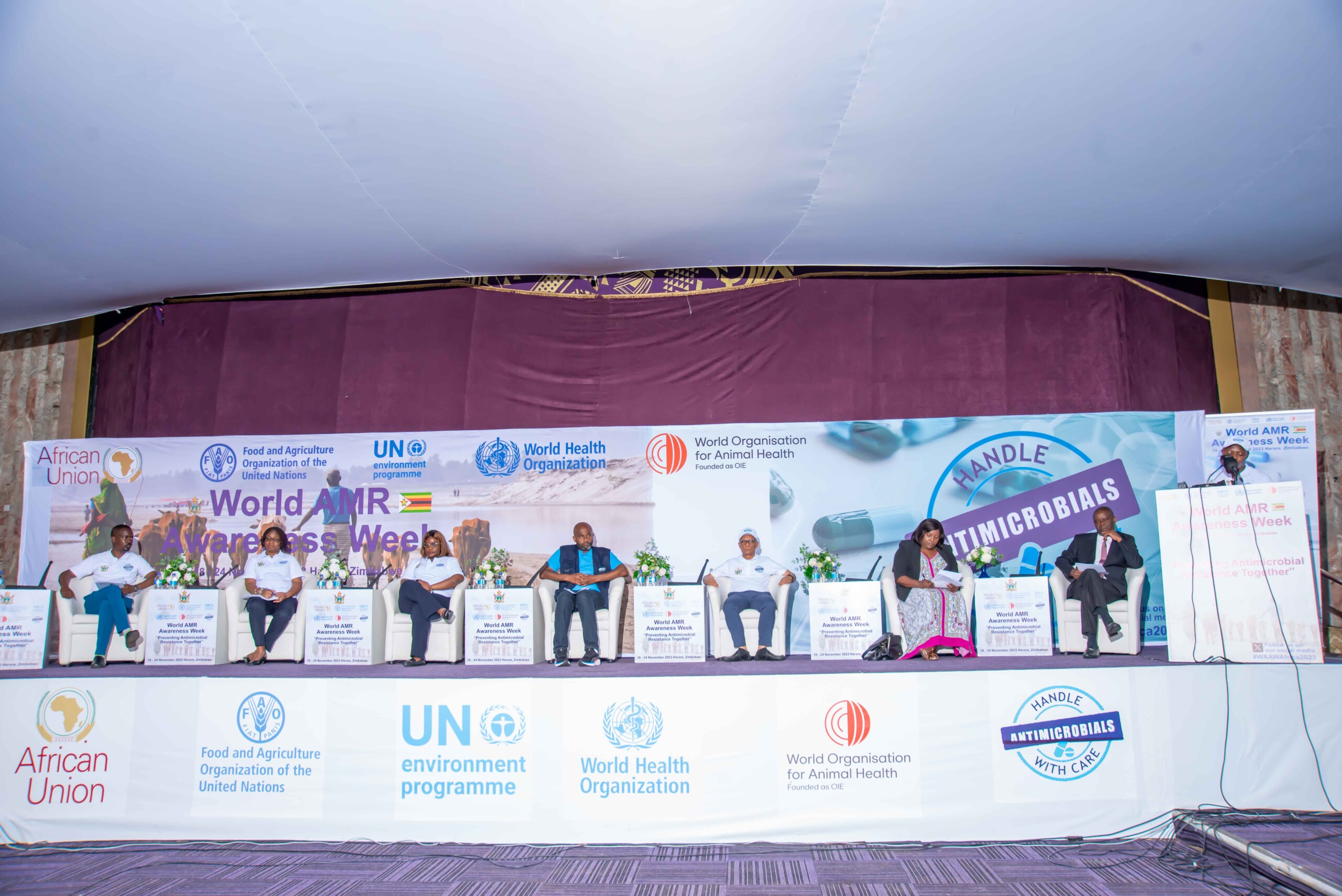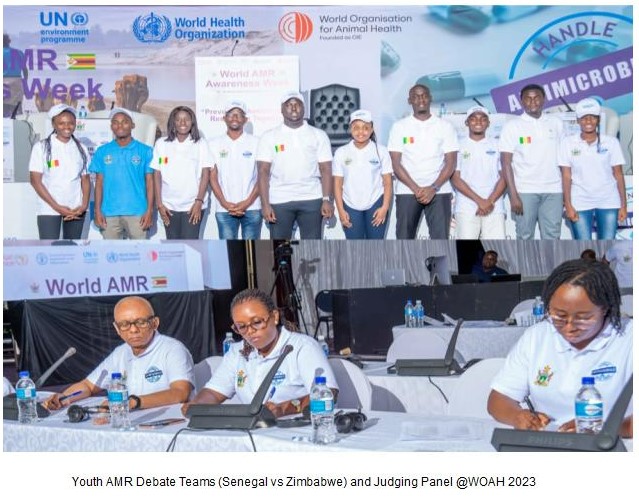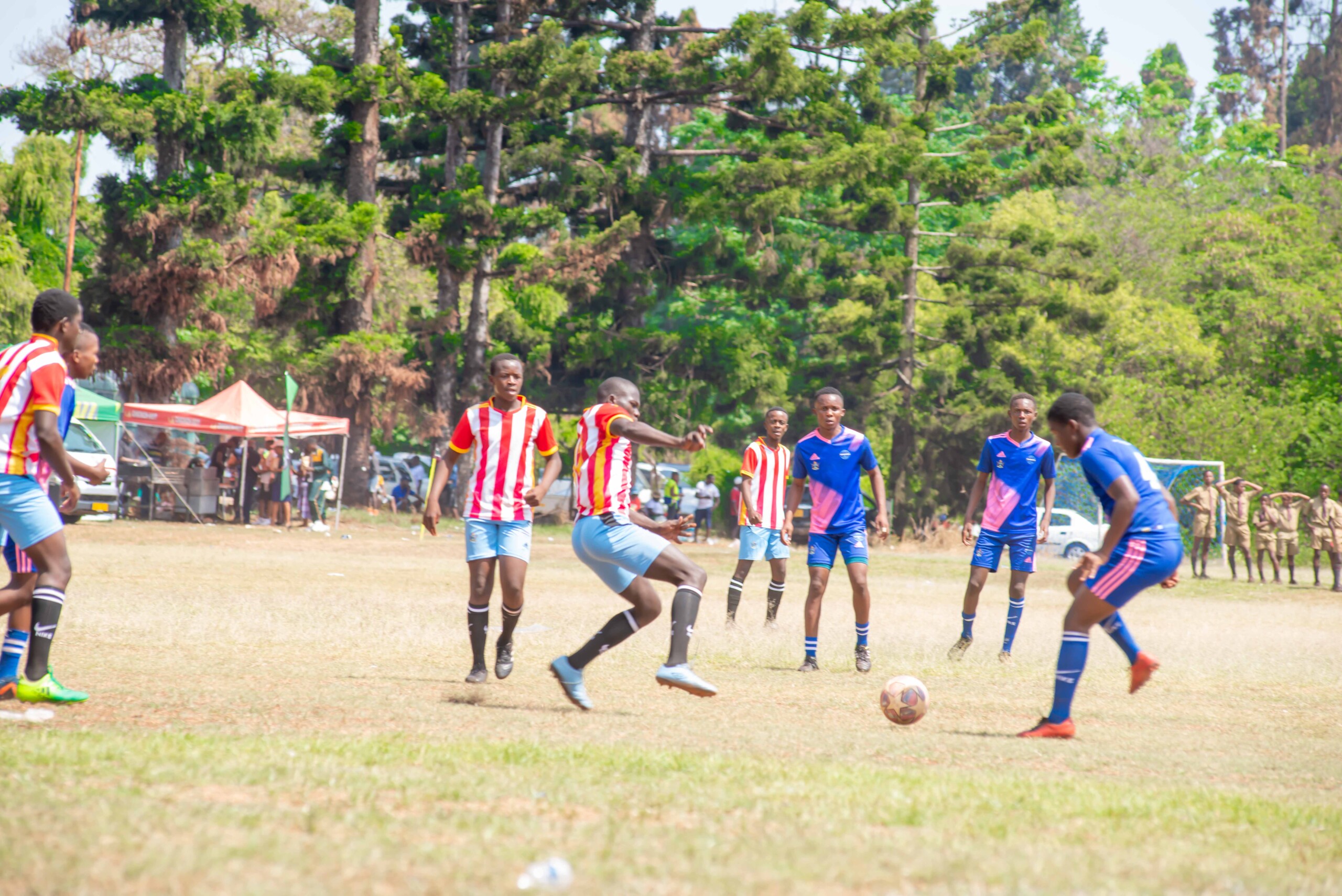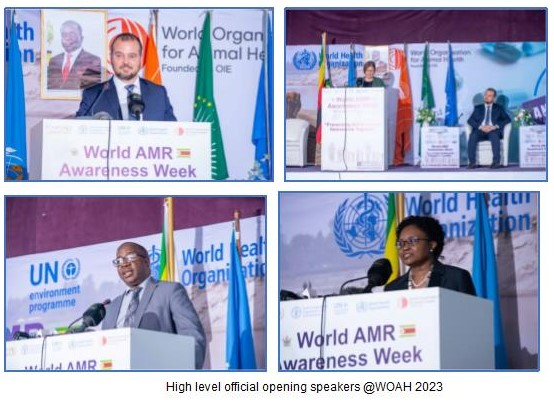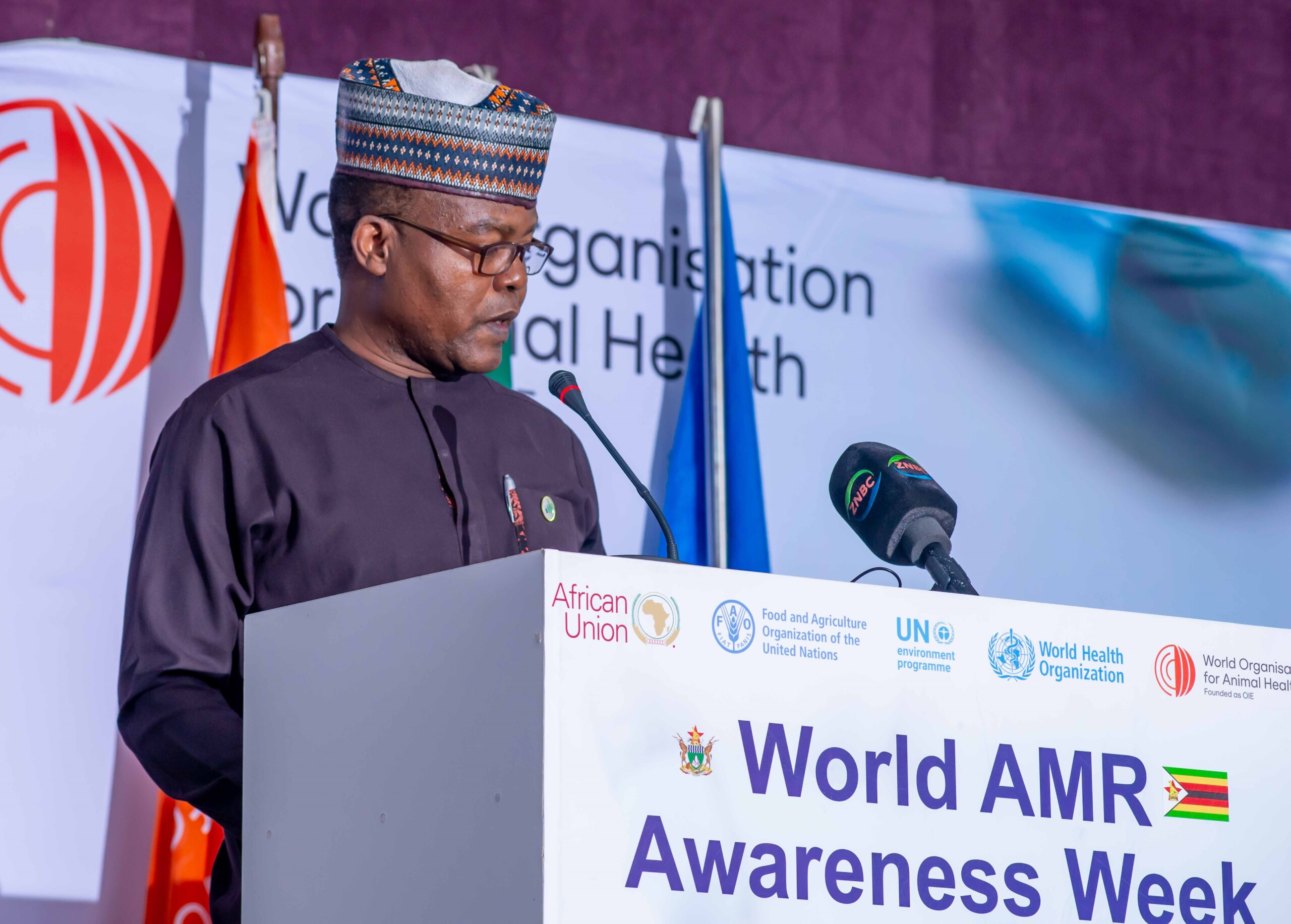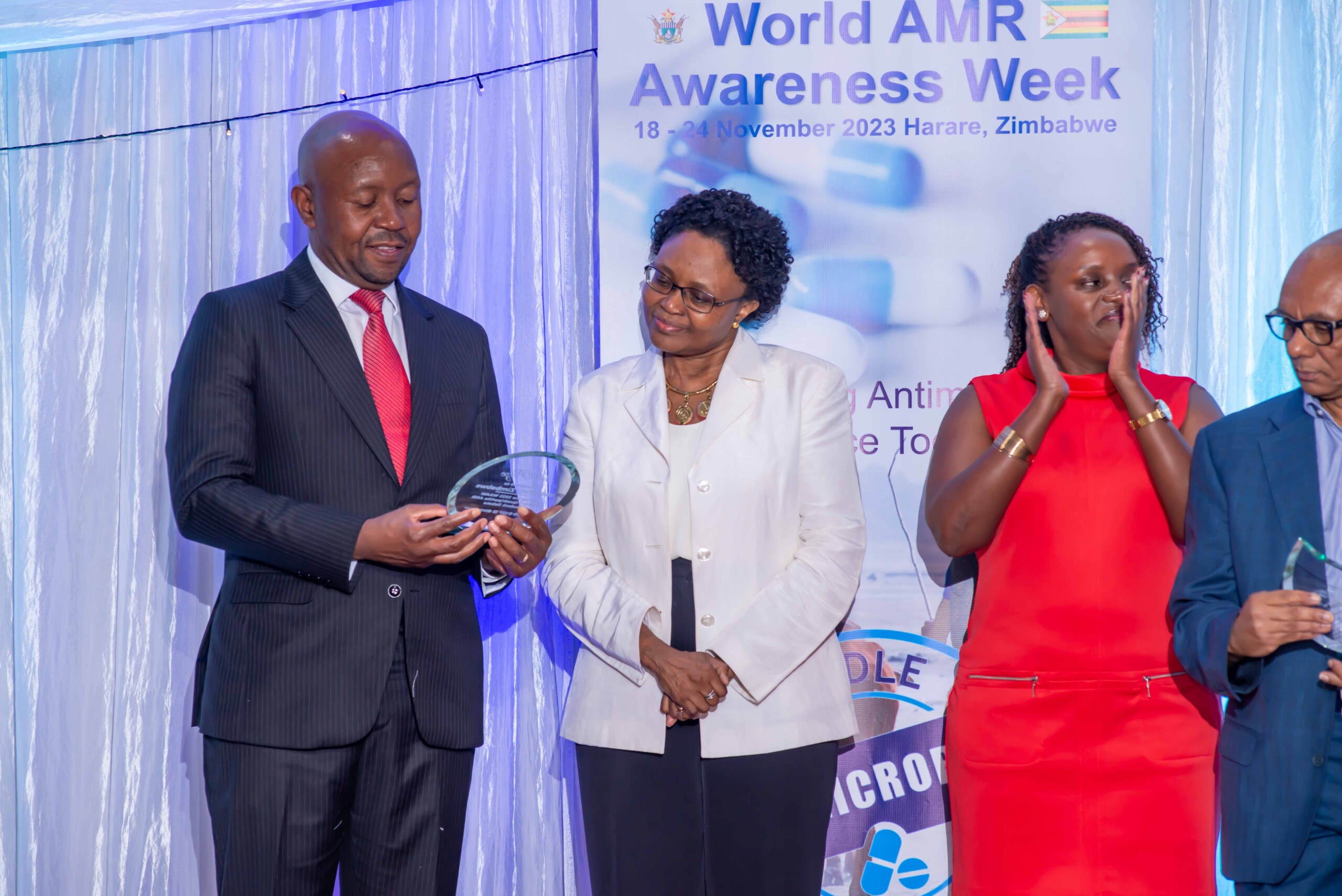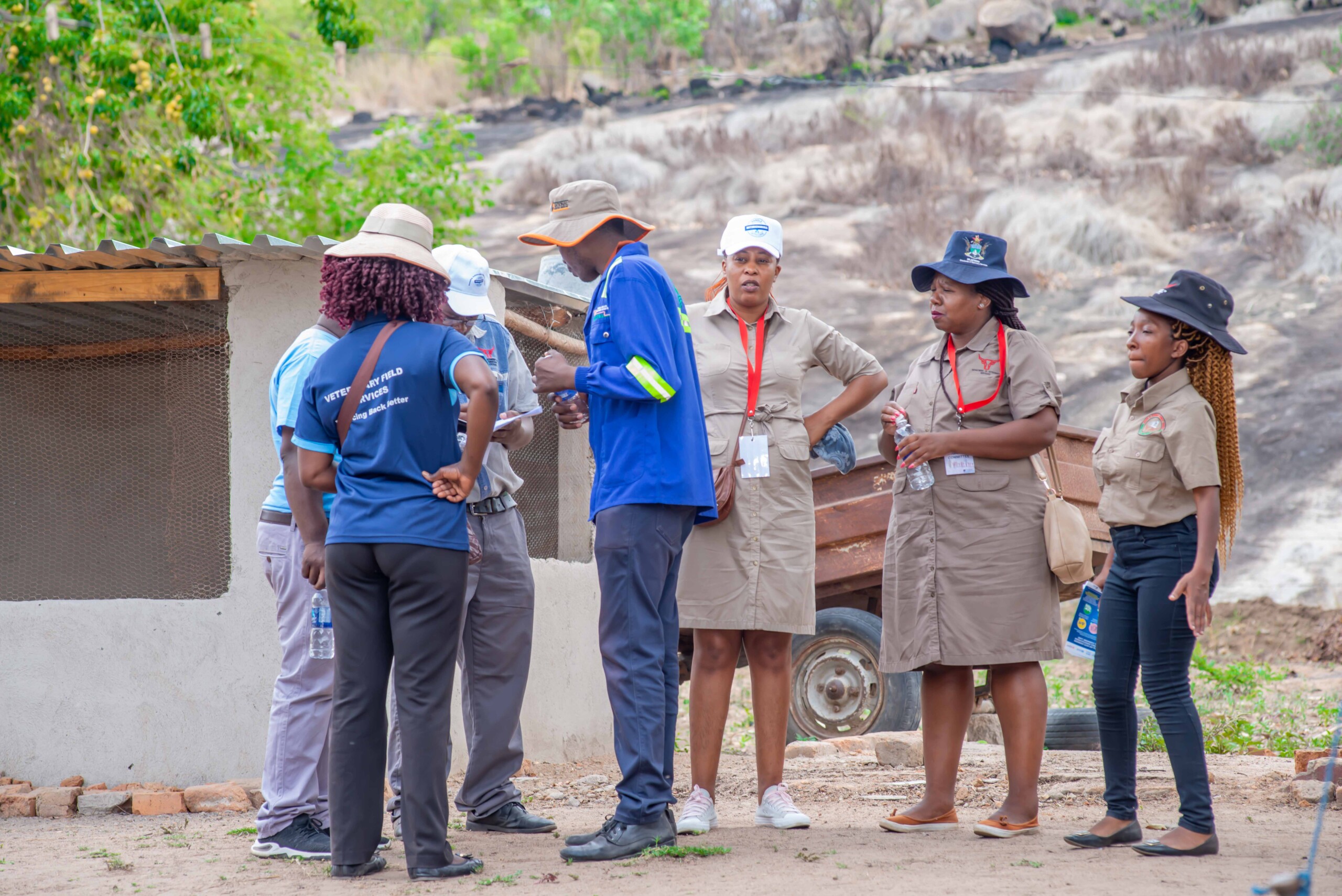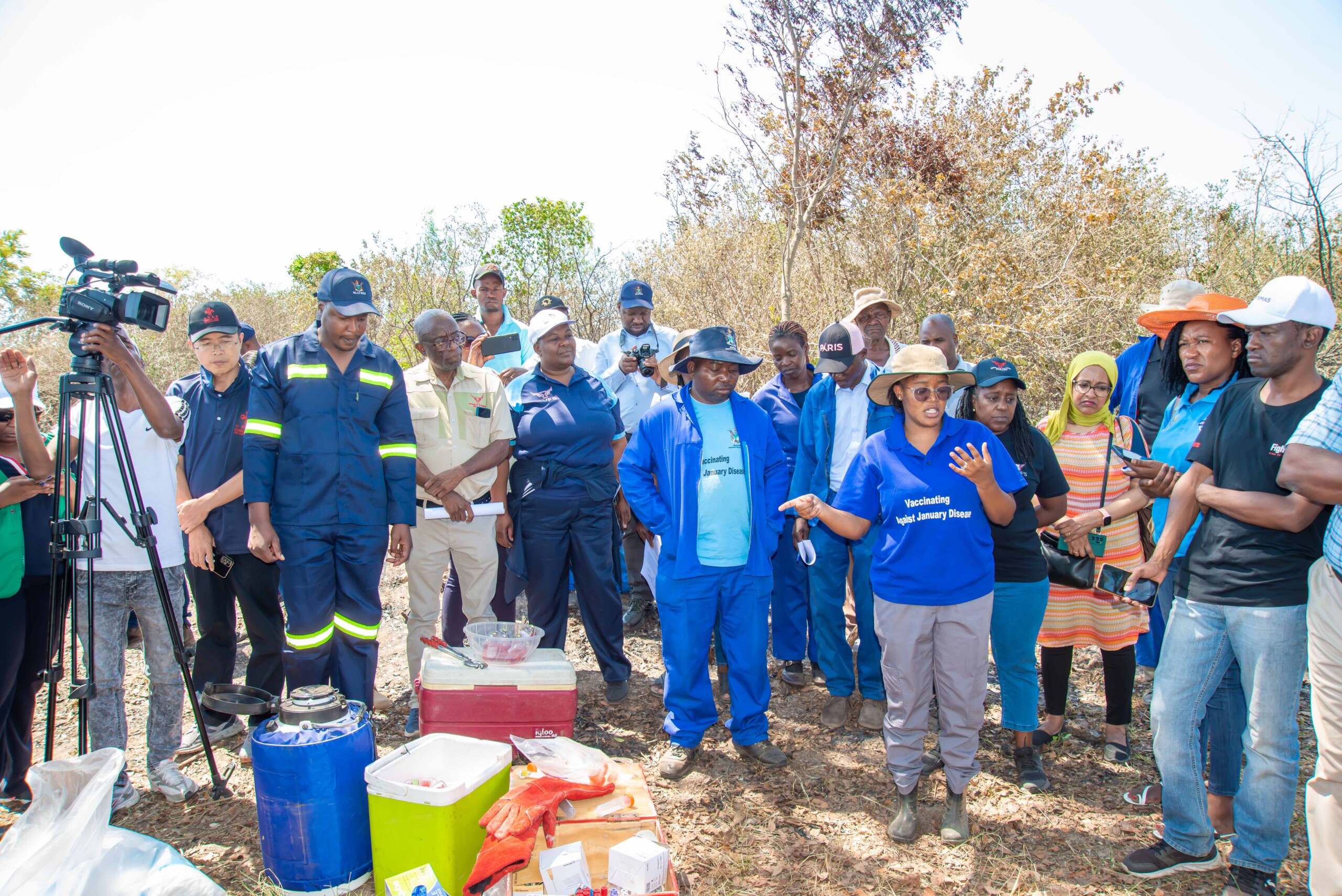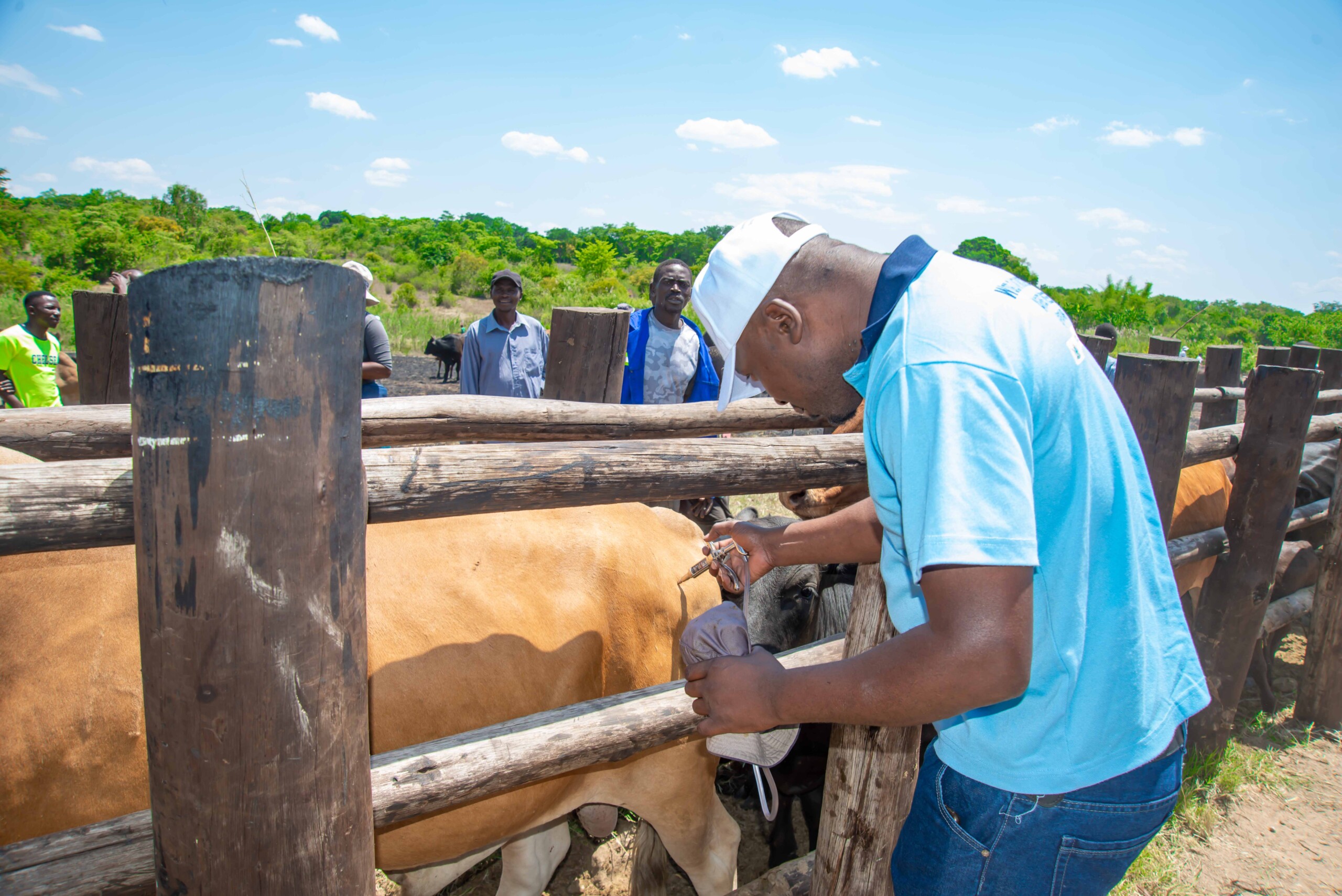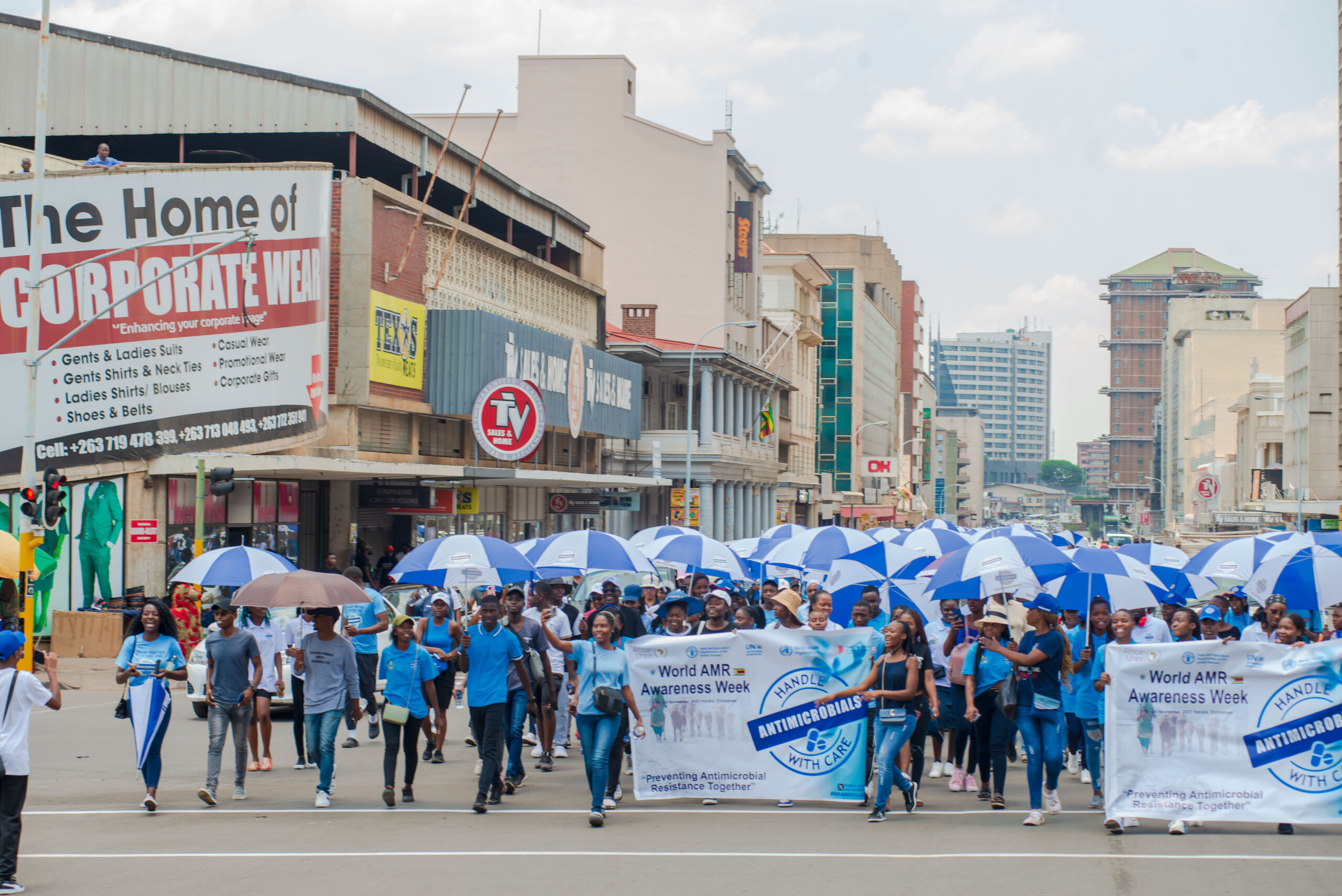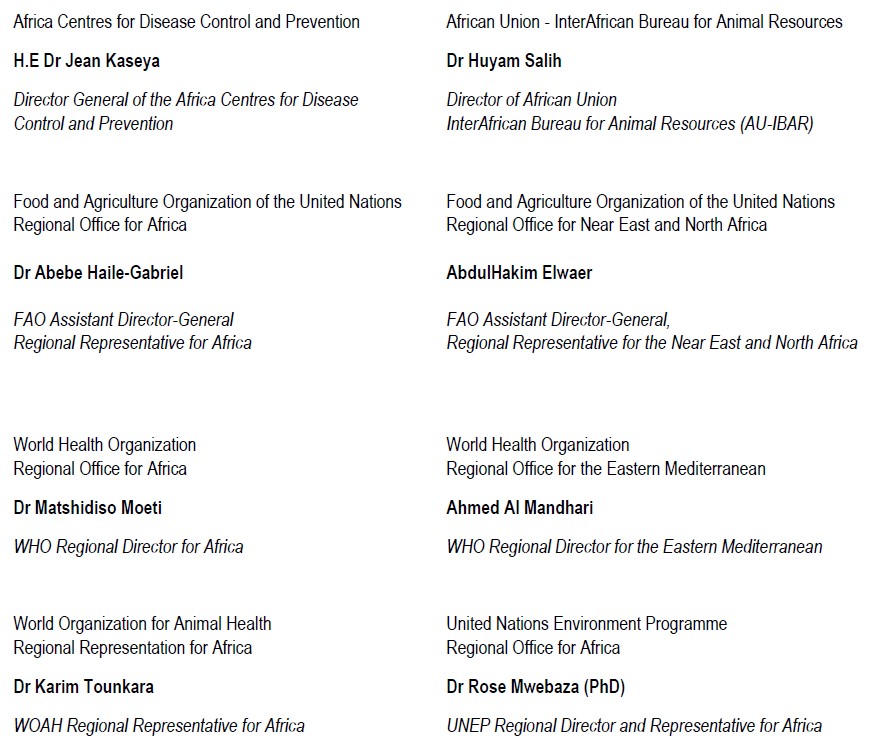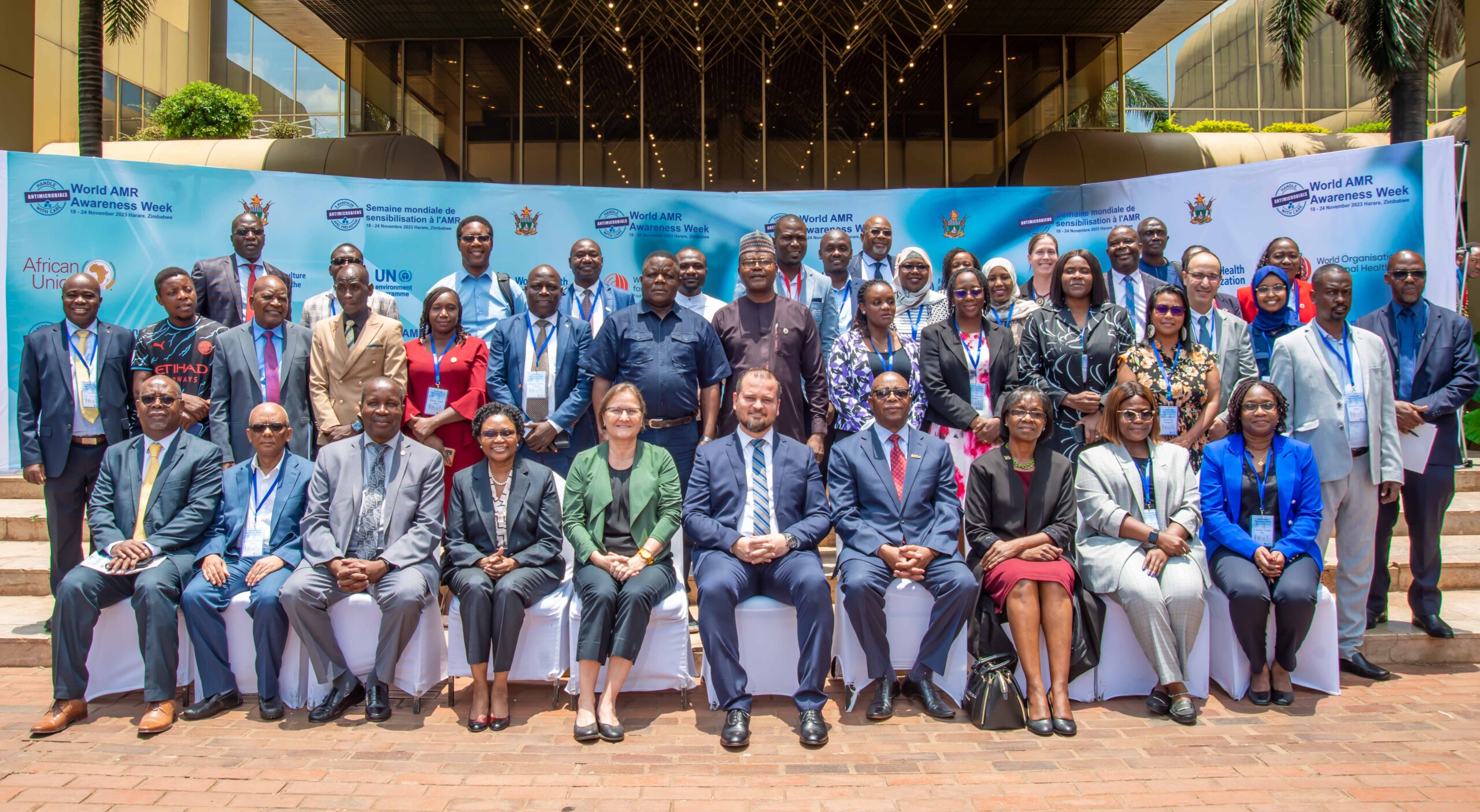
The Quadripartite partners consisting of the Food and Agriculture Organization (United Nations FAO), the United Nations Environment Programme (UNEP), the World Health Organization (WHO), and the World Organisation for Animal Health (WOAH), in partnership with African Union agencies, Africa CDC and African Union Interafrican Bureau for Animal Resources (AU IBAR) together with the Government of Zimbabwe, this year hosted the continental celebration of the World Antimicrobial Resistance (AMR) Awareness Week (WAAW) 2023 in Harare, Zimbabwe.
The factors driving the emergence of AMR are complex and multifactorial therefore requiring the use of a multidisciplinary approach to address them. Accordingly, AMR requires a collective and practical response. To mitigate AMR risks with a holistic approach, the Africa Union agencies i.e. Africa Centres for Disease Control and Prevention (Africa-CDC) and the Interafrican Bureau for Animal Resources (AU-IBAR), the Food and Agriculture Organization of the United Nations (FAO), the United Nations Environment Programme (UNEP), the World Health Organization (WHO) and the World Organisation for Animal Health (WOAH) are working closely together at all levels to achieve this. The One Health approach is a holistic approach that aims to sustainably balance and optimize the health of people, animals, ecosystems, and the wider environment. It mobilizes multiple sectors, disciplines, and communities to work together to foster well-being and tackle threats to health and ecosystems. Taking a ‘One Health’ approach has many benefits, such as complementarity for amplified impact, cost savings incurred by addressing multiple threats simultaneously etc.
This year’s celebration was dedicated to showcasing the value of the One Health approach in preventing AMR in Africa and highlighting the progressive collaboration between the Africa Quadripartite and AU Agencies on combatting AMR. Furthermore, recognizing Zimbabwe’s very active role on combatting AMR, through Government intervention and partners such as the Multi-Party Trust Fund (MPTF) and the Fleming Fund. A notable success story is the preliminary production of the BOLVAC vaccine, against theileriosis, an alternative to the use of antimicrobials.
Specific objectives of the 5th WAAW were to:
The week-long event had a diverse set of activities that were linked to the overall objectives of AMR strategies and contributed to the advancement of combatting AMR in Africa. The activities included
The WAAW Africa commemorations kicked off with a media briefing at the Harare International Convention Centre that was attended by 40 media representatives from six national broadcasters, four international media bureaus and independent journalists. The Government of Zimbabwe, represented by Dr Pious Makaya (Ministry of Agriculture) and Dr Chikodzore (Ministry of Health and Child Care) highlighted Zimbabwe’s achievements of the National Action Plan (NAP) for AMR (2017-2022) and updated the audience on the draft for a new 5-year NAP (2023-2028) that is linked to the national blueprints including the livestock policy.
The Africa Quadripartite and African Union Agencies highlighted the activities of the week and delivered an overview of antibiotics, the beginnings of antibiotic resistance, leading up to global research and development of the global action plan for AMR, with some emphasis on collective and specific sectorial AMR strategies. The African Union mentioned the efforts of the AU in establishing and advocating for a common and collective position of African countries on AMR to be presented at the upcoming UN Assembly of 2024. Following the panel’s briefing, an interactive discussion and questions from the media and the floor were taken. Considering the importance of social media, Africa-CDC hosted a live conversation on AMR on X (formerly Twitter) Spaces to raise awareness of AMR and promoting behavioural change through public communication programmes that target different audiences in human health, animal health and agricultural practice, as well as consumers.
Panelists answering the media (fltr) Mohamed Sirdar (WOAH), Irene Ouoba (FAO), Yewande Alimi (Africa CDC), Walter Fuller (WHO), Ali Yahaya (WHO), Chikodzore (Ministry of Health and Child Care, Zimbabwe) and Dr Makaya (Ministry of Agriculture, Zimbabwe) Picture (c) communication (woah) 2023.
The WHO-led Youth Debate was an activity geared towards engagement of university students to increase AMR awareness. Senegal and Zimbabwe teams engaged in a spirited debate on the motion “The problem of antimicrobial resistance has more to do with Biology and Science than Society and Behavior”. The Senegal team won the round and qualified for the finals to debate with team Zambia. The motion for the finals was “Policy makers have a bigger role to play in addressing antimicrobial resistance than doctors, farmers, patients and the Pharmaceutical industry”. Both teams showcased well researched arguments to propose and/oppose the motion. Senegal emerged winner of the Youth Debate and produced two of the best speakers.
AMR Youth Debate’s teams (Senegal and Zimbabwe, above) and panel of judges (below). Picture (c) communication (woah) 2023.
High School Football Teams, Zimbabwe. WAAW 2023. Picture (c) communication (woah) 2023
Zimbabwe High School Football Teams tournament in full swing. WAAW 2023. Picture (c) communication (woah) 2023
WOAH together with the Government of Zimbabwe organised an AMR Football Tournament to raise awareness on AMR amongst high school students, involving eight teams from eight boys’ high schools in Harare. The football commentator was furnished with AMR messages that were delivered in his commentary of the matches. The matches attracted viewership from the community and an estimated 1,500 people were reached with the AMR messages. Dr Moetapele Letshwenyo (WOAH Sub-Regional Representative for Southern Africa) awarded medals and trophies to the winning teams and best players.
The high level dignitaries for the ceremony in addition to the Presidential Advisor included:
The high-level dignitaries provided opening remarks, emphasising the importance of multisectoral collaboration and taking a One Health approach in tackling AMR in Africa. The speeches from the Minister of Health and that of the Minister for Lands and Agriculture, emphasised the gains that Zimbabwe had made through partnerships with the intergovernmental organisations present. Most notably the contributions of the AMR-MPFT and Fleming Fund projects in advancing the laboratory capacity, AMR policy, and AMR curricula in the country. The opening ceremony attracted extensive media coverage, with the same being publicised in audio-visual, print and social media and setting the tone and pace for the week-long AMR awareness activities.
High level official opening session. Picture (c) communication (woah) 2023.
The high-level official opening ceremony was followed by two sessions on:
The two sessions emphasised the role of multisectoral collaborations in AMR NAP implementation in Africa. The 1st panel discussion drew participation from Cabo Verde, Congo (Dem. Rep.), Kenya and Zimbabwe. The 2nd policy dialogue featured animal health panellists including
In his keynote address, Dr Vakuru emphasized the opportunity to identify common areas in the NAPs of various countries for strategic continental interventions.
Keynote address by Dr Columba Vakuru, WOAH Delegate of Nigeria. PIcture (c) communication (woah) 2023.
WOAH and UNEP embarked on a series of webinars on Substandard and falsified medicines (SFM), Public-Private-Partnerships (PPP) in AMR and the environmental dimensions of AMR. The first two webinars highlighted WOAH’s programme on substandard and falsified veterinary products as well as the role of international partners in contributing to development of a reference manual on legislation, relating to substandard and falsified medical products. WHO highlighted its contribution on this issue, noting its published alerts on SFM in the medical sector as reported by its members. Further examples on the regulatory framework at national level for SFM was provided by Zimbabwe sharing progress made under the AMR-MPTF project. The PPP webinar featured two presentations that were delivered by Dr Rahul Srivastava (PPP Project at WOAH Paris) and Dr David Graham (CEO of Animal Health Ireland).
Keynote address by Dr Columba Vakuru, WOAH Delegate of Nigeria. PIcture (c) communication (woah) 2023.
In his presentation, Dr Shrivastava spoke about PPPs to contain AMR through identification of AMR supply chains and how public and private sectors can work together to combat AMR. Dr Graham shared the detailed experience of Ireland on PPP in the dairy sector. Further discussions and experience sharing were observed with a panel of national experts including
The last webinar showcased the environmental dimensions of AMR and was jointly delivered by UNEP and the Ministry of Environment in Zimbabwe. The presentation from the Ministry of Environment underlined that the country had put in place the Environmental Management Agency Laboratory which is mandated to carry out tests on AMR in the environment. However, the country is still grappling with implementation of policies to control pollution of water systems and the environment in general with medical and industrial waste.
The WHO, in collaboration with the Ministry of Health in Zimbabwe and with the kind sponsorship of FAO, convened a high-level awards ceremony for various categories of themes and topics. The occasion was graced by the Permanent Secretary of the Minister of Health and Childcare and the WHO Assistant Regional Director, Dr Lindiwe Makubalo. Awards were presented to the top players of the winning football teams from the AMR Soccer Tournament and the winning country teams for the AMR Youth Debate.
Awards Ceremony (fltr) Permanent Secretary, Ministry for Health and Child Care, WHO ARD, WOAH One Health Regional Coordinator, WHO AFRO AMR Lead. Picture (c) communication (woah) 2023.
Awards Ceremony (fltr) Permanent Secretary, Ministry for Health and Child Care, WHO Assistant Regional Director, WOAH One Health Regional Coordinator, and WHO-AFRO AMR Lead. Picture (c) communication (woah) 2023.
Within the same event, WHO led the inaugural media award competition, that was specifically designed for journalists and media practitioners from the Africa region. The competition aimed to recognise and celebrate outstanding work in the field of health communication, particularly stories that shed light on the critical issue of antimicrobial resistance. The competition particularly fostered a sense of community and collaboration among journalists and media professionals as key stakeholders in AMR stewardship, inspiring them to continue their exceptional work and contribute to the global fight against antimicrobial resistance. Two journalists from Kenya and one each from Ethiopia and Uganda were feted during the ceremony.
Farmer Field Schools in Murehwa District, Zimbabwe. Picture (c) communication (woah) 2023
A field visit was organised to Murehwa District showcasing the FAO-supported Farm Field Schools programme. Murehwa poultry farmers revealed that the FAO programme, which taught them about AMR, not only provided them with much-needed knowledge but also improved their livelihoods. The programme focuses on behaviour change in antimicrobial use in their farming productions. To show that the AMR awareness programme in poultry farming had really been well received in the Murewa rural farming community, pupils from nearby schools were reciting poems and acting-out dramas on AMR. On the other hand, the farmers who were part of the Farm Field School, also showcased their knowledge and approaciation through sketches, reciting poems and acting-out dramas on AMR topics, much to the appreciation of guests who gathered at Mukusha Homestead.
Farmer Field Schools in Murehwa District, Zimbabwe. Picture (c) communication (woah) 2023
BOLVAC Vaccination, Goromonzi District, Zimbabwe. Picture (c) communication (woah) 2023
BOLVAC Vaccination, Goromonzi District, Zimbabwe. Picture (c) communication (woah) 2023
WOAH in close collaboration with the Veterinary Services of Zimbabwe organised a vaccination campaign against January disease (theileriosis, using BOLVAC) at Goromonzi District to advocate and educate farmers and the community on animal vaccination as a preventive strategy against disease, in order to better control antimicrobial use (AMU) and AMR. The campaign was aimed at vaccinating cattle against theileriosis (January disease), using the BOLVAC vaccine, produced in-house by the Veterinary Services of Zimbabwe and funded by the AMR-MPTF project and other partners. Over 500 cattle were vaccinated and dipped for tick control at the same time.
BOLVAC Vaccination, Goromonzi District, Zimbabwe. Picture (c) communication (woah) 2023
The 5th WAAW Africa ended on a high note, starting with laboratory visits to the antimicrobial resistance-related sections of the Laboratory units at the Veterinary Services (animal health) and the Harare Central Hospital (human health). Both of these laboratories are the principal referral laboratories for animal and human health and have been refurbished with funds from the Fleming Fund project. It was impressive to observe the upgrade in the facilities and the state-of-the-art equipment for AMR testing. Laboratory visits were followed by the AMR Walkathon organised by the national One Health AMR Secretariat, in collaboration with the University of Zimbabwe medical school students. The Walkathon was roughly 1.5 kms routing through the central business district of Harare and ending at Unity Square grounds. Approximately 500 people joined the Walkathon. Walkers were branded with WAAW T-shirts, caps, umbrellas and bags. The WAAW was officially closed at the Unity Square grounds, with closing remarks delivered by representatives from the Quadripartite and AU, the students, and Dr Pious Makaya on behalf of the Government of Zimbabwe.
University students and members of the public during the AMR Walkathon event during the WAAW Africa event in Harare, Zimbabwe. Picture (c) communication (woah) 2023.
Preventing Antimicrobial Resistance Together
We, the African Leadership of the:
Have convened for the 5th Africa Continental World AMR Awareness Week (WAAW) 2023 to raise awareness, catalyse actions on antimicrobial resistance (AMR) governance, and assess progress in the region towards mitigating antimicrobial resistance.
NOTE that antimicrobial agents, including antibiotics, antifungals, antiparasitic, and antivirals have saved millions of lives globally and substantially reducing the burden of diseases in people, animals, and plants/crops, improving quality of life, contributing to better food security and safety, and enhancing life expectancy.
RECOGNISE that the emergence and spread of AMR in diverse microorganisms is reversing these benefits and further complicating the management of many infectious diseases.
EXPRESS our concern over AMR as a significant threat to human development and the fight against infectious diseases that also jeopardizes animal health and welfare and food production, and adversely affects the functioning of human, animal, and plant health systems and economies.
CONCERNED by uncontrolled antimicrobial overuse and misuse across the African Continent, including the inadequate use of antimicrobials and the use of falsified and proliferation of substandard and counterfeit medicines in the context of inadequate oversight on production, procurement, quality, and surveillance.
NOTE the importance of antimicrobials as front-line treatments in combating a host of diseases in humans, animals (terrestrial and aquatic) and plants/crops, while also supporting and enhancing agricultural and environmental practices to reduce the risk of disease transmission.
ACKNOWLEDGE that the lack of awareness of AMR continues to hamper efforts for transformational changes in practices, regulations, and oversight.
RECOGNISE that effective AMR governance is essential to promote sustainable actions which should include both proper institutional arrangements and strong societal demand from both public and private sectors for the successful governance of antimicrobials at both global and regional levels.
ACKNOWLEDGE that several promising first steps have been taken to strengthen AMR governance at global, regional, and national levels.
UNDERSCORE the importance of adopting a comprehensive and multisectoral “One Health’ approach to address the rising threat of AMR through integrated actions across human, animal (terrestrial and aquatic), plant/crop, and environmental health sectors.
RECALL the existing global and continental commitments including the Global Action Plan on Antimicrobial Resistance 2015, Africa Common Position on Antimicrobial Resistance, Africa Union Framework for Antimicrobial Resistance Control, FAO’s Action Plan on Antimicrobial Resistance, and WOAH Strategy on Antimicrobial Resistance and the Prudent Use of Antimicrobials.
MINDFUL that tackling AMR is a crucial Sustainable Development Agenda issue and will be critical in achieving the Sustainable Development Goals (SDGs) and improving food and nutrition security and livelihoods in Africa’s predominantly farming-based economies.
We, the African Leadership of Africa CDC, AU-IBAR, FAO, WOAH, WHO, and UNEP, commit to:
The Leaderships’ signatures below record their joint acceptance and commitment to this communiqué dated 24th November 2023.
Adopted on 24th November 2023 in Harare, Zimbabwe
